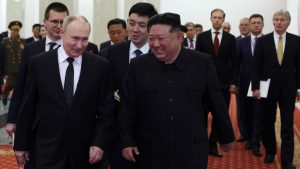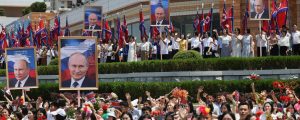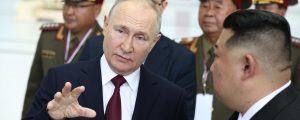The results of the June 19 talks between Vladimir Putin and Kim Jong Un in Pyongyang are of paramount political importance to the entire Asia-Pacific region, experts told Sputnik.

Russian President Vladimir Putin and North Korean leader Kim Jong Un have signed a Comprehensive Strategic Partnership Agreement that aims to serve as a roadmap for future bilateral cooperation in all spheres.
The document on comprehensive partnership provides, among other things, for mutual military assistance in case of aggression against one of the participants, Putin told reporters after the face-to-face talks with Kim on Wednesday.
The Russian leader also denounced the “indefinite restrictions regime” imposed on North Korea by the UN Security Council (UNSC), which includes an arms embargo, as “orchestrated by the US” and urged for it to be revised. The Putin-Kim negotiations came as part of the Russian president’s June 18-19 visit to North Korea.
‘Full-Blown Shift in Regional Paradigm’
The Russia-North Korea comprehensive partnership agreement’s clause on military aid stipulates allied relations between the two, Artyom Lukin, a professor of international politics at the Far Eastern Federal University in Vladivostok, told Sputnik.
“Implications of the signing of the agreement have yet to be [fully] assessed, because this means a complete change of paradigm on the Korean Peninsula [and] in Northeast Asia [on the whole],” Lukin said. He recalled that right now, only the US has full-fledged military-political alliances in the region, including those with Japan and South Korea.
The fact that Russia has inked the Comprehensive Strategic Partnership Agreement with North Korea implies that “a completely different situation is now shaping on the Korean Peninsula, and that a Russian [-North Korean military] alliance has appeared in Northeast Asia,” according to Lukin.
“This is a very significant thing, even against the backdrop of what is currently happening the world. The Russian-North Korean alliance poses a direct challenge to the military-political hegemony of the US in Asia and Pacific, namely, in Northeast Asia, which is the main part of the region,” the analyst noted.
When it comes to the UNSC’s anti-North Korean sanctions, Lukin underscored that “certainly, there are ways to prevent these restrictions from interfering with the Moscow-Pyongyang collaboration.”
Speaking to Sputnik, Dr. Victor Teo, a political scientist who specializes in international relations in the Indo-Pacific region, said that Putin’s proposal to review the UN sanctions on North Korea “is, of course, understandable in light of this agreement.”
“The problem, however, is that this is probably easier said than done because the amendments probably need to be ratified by the other [UNSC] members, one of which is the United States,” the pundit added.
 People of North Korea greet Russian President Vladimir Putin – Sputnik International, 1920, 19.06.2024
People of North Korea greet Russian President Vladimir Putin – Sputnik International, 1920, 19.06.2024
From Strong Russia to Impressive Pyongyang: Key Takeaways From Putin-Kim Talks
He described Putin and Kim signing the deal as “a significant political and strategic development because it effectively links European security more tightly to Asian security in the formal sense.”
“The DPRK would be obliged to help Russia defend itself if Russia gets into a conflict with NATO countries; just as Russia would be obliged to help Pyongyang if North Korea enters into a conflict with the US and South Korea,” Teo pointed out.
Putin’s N Korea Visit Reflects Sanctions’ Inefficiency
Professor Joe Siracusa, a political scientist and dean of global futures at Australia’s Curtin University, in turn, focused on the political implications of Putin’s visit to North Korea. In an interview with Sputnik, he said that the Russian president “is telling the Americans and the others” that his country has “not been isolated either by [Western] sanctions or by other things.”
“Anyway, I think that Putin is showing that sanctions don’t work. When he does this, he demonstrates to the world that there is an alternate universe out there. It’s not a rules-based system that’s determined in Washington and London, there’s a rules-based system that evolves organically beyond this usual corridor of power. I think it’s a very healthy achievement in that sense,” Siracusa said.
Putin’s current visit is “the normal business of a nation,” according to the political scientist.
“There is a common border with North Korea. It was Russian troops that liberated Korea in 1945 and supported the North Koreans in their civil war against the South Koreans. Russia has a long history of economic and security relations with North Korea. I think it’s normal,” Siracusa stressed.
 Vladimir Putin and Kim Jong Un at Vostochny Cosmodrome – Sputnik International, 1920, 19.06.2024
Vladimir Putin and Kim Jong Un at Vostochny Cosmodrome – Sputnik International, 1920, 19.06.2024
President Putin Strengthens Ties with North Korea in Official Visit
On the whole, the Russian leader’s state visit to North Korea was very impressive, the pundit evaluated, pointing to the fact that Putin “got the red carpet treatment’ and that “Chairman Kim came out to the plane to meet him.”
The analyst rejected allegations by the American political and foreign policy elite that Russia and North Korea are “bad guys” who pose a threat to the West as being “absolutely false.”
“This is the kind of that propaganda mill that goes on in Washington with the mainstream media playing sort of the Greek chorus for the American political elite,” Siracusa concluded.
By Oleg Burunov
Published by Sputnik Globe
Republished by The 21st Century
The views expressed in this article are solely those of the author and do not necessarily reflect the opinions of 21cir.com
